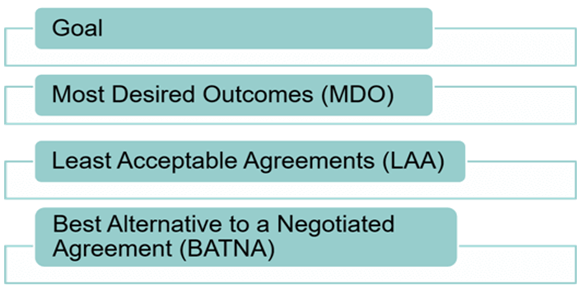Negotiations play a crucial role in our lifestyle. It is often applied in many aspects of the lifestyle from price negotiating in an open market, salary negotiation in an interview, closing a possible sales deal to even a company acquisition. The techniques of negotiations are the key to success. Strong interpersonal and communication skills are vital to achieving the required results.
Within the increasingly competitive market, the success of a business depends on good negotiation. However, poor negotiation can potentially cause harm to the company by losing its key customers or suppliers. As such, successful business negotiation could also be a core leadership and management skills.

Table of Contents
Preparing for Negotiation
A negotiating situation exists once someone is in any communication or problem-solving situation with others which might compute to their advantage. Their overriding aim in any negotiation is to grasp the objectives that both parties have set. There are other aims, like getting an honest deal and improving their relationship with the other side. Always keep this aim firmly in sights and do not stop until it has been achieved.
Preparation is responsible for the success of the negotiations. The more prepared the negotiators are before the meeting, the more likely it is that the outcome of the meeting will be acceptable to all parties involved.
During preparation, they should gather information about the other party’s offer and use it to refine their own. There are two most important things to do during preparation: First, possess as much information as possible about the upcoming negotiations. Second, be fully prepared for any situation throughout the entire process. Obtain as much information by choosing good inquiries to ask that are well thought out. Remember that the power usually goes to the person who has the best information.
The diagram below depicts the negotiating envelope that should be created before any negotiation begin.

Active Listening
Negotiators need to focus and listen attentively to the opposite party during the conversation. Active listening includes the capability to read visual and verbal communication. It is vital to pay attention to the opposite party to seek out areas for compromise during the meeting. Instead of spending most of the time in negotiation while defending the viewpoint, experienced negotiator will spend more time taking note of what the other party said and find clues for further debate. A successful negotiator uses active listening not only to resolve any conflict that might arise but also to obtain as many insights to produce satisfaction and maximizing value.
Effective Communication and Emotion Control
It is critical for a negotiator to be able to control their emotions during the negotiating process. Negotiating on sensitive issues can be exhausting and allowing feelings to take control during the meeting where it can exacerbate the situation. As such, it will result in negative outcomes. Negotiators must be able to communicate clearly and effectively with the other side. If the key person does not state his case clearly, there may be misunderstanding. An effective negotiator must be able to state his desired outcome as well as the rationale during a negotiation meeting.
Collaborative Problem Solving
Negotiation is not all about pitting one side against the other. Effective negotiators must be willing to work as a team and maintain a positive attitude throughout negotiations. They work on reaching an understanding on all the aspects of the contract that the two sides agree on before moving on to finding amicable solutions to the remaining problems.Employees with good negotiation skills can come up with many solutions to the problems. Rather than concentrating on the desired goal for the negotiation, the individual with skills can concentrate on problem-solving, which may lead to a breakthrough in communication and thus benefit each side of the problem.

Creating Win-Win Situations
To have a successful negotiation, it is always highly urged to create a win-win situation to reach mutual agreement during a collaborative style where all parties are satisfied. The term refers to a situation by which compromise, cooperation or a participation during a group activity benefits all the people involved. The phrase could also be used to several aspects of lifestyle in business, organization or maybe during a personal relationship. In this situation, there is no loser nor winner as both parties will have their justifiable share of success. It also specializes in maintaining the connection by not allowing the disagreement to damage the interpersonal relationship, not blaming the others for the matter, and getting to confront the matter not the people. This will involve actively supporting the opposite individuals while confronting the matter. As such, creating win-win situation are highly valued for future partnership.
The conflict table depicts different scenarios for various potential negotiation outcomes. It is strongly recommended rate on the “You Win – I Win” approach.
The full content is only visible to SIPMM members
Already a member? Please Login to continue reading.
References
Bassem Assi. (2016). “Top Ten Effective Negotiation Skills”. Retrieved from https://www.linkedin.com/pulse/top-ten-effective-negotiation-skills-assi-mba-dph-mph-mfm, accessed 18/03/2021.
Chew JinSwee, DPSM. (2018). “Essential Strategies for a Successful Procurement Negotiation”. Retrieved from SIPMM: https://publication.sipmm.edu.sg/essential-strategies-successful-procurement-negotiation, accessed 18/03/2021.
Eric Garner. (2017). “7 Strategies That Boost Negotiation Success”. Retrieved from https://www.businessknowhow.com/growth/negotiations.htm, accessed 18/03/2021.
Joanne Chia Jia Rong, DPSM. (2020). “Key Techniques for Successful Procurement Negotiation”. Retrieved from SIPMM: https://publication.sipmm.edu.sg/key-techniques-successful-procurement-negotiation/#Procurement_or_Purchasing_Negotiation, accessed 18/03/2021.
Teng Chooi Min Manice, DPSM. (2020). “Negotiating Techniques for Construction Procurement”. Retrieved from SIPMM: https://publication.sipmm.edu.sg/negotiating-techniques-for-construction-procurement/, accessed 18/03/2021.
Yves Bemelmans. (2017). “7 Key skills for successful negotiation”. Retrieved from https://procurement-academy.com/7-key-skills-successful-negotiation/, accessed 18/03/2021.

